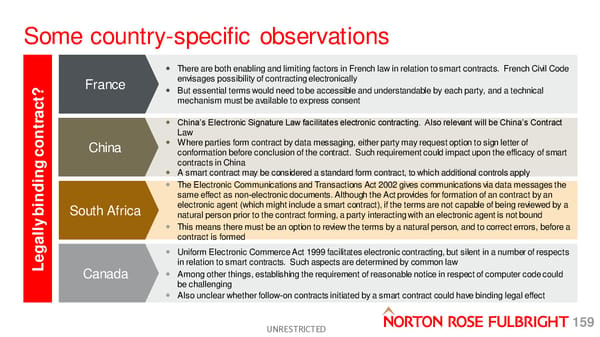Some country-specific observations There are both enabling and limiting factors in French law in relation to smart contracts. French Civil Code France envisages possibility of contracting electronically ?t But essential terms would need to be accessible and understandable by each party, and a technical ca mechanism must be available to express consent r t China’s Electronic Signature Law facilitates electronic contracting. Also relevant will be China’s Contract Law on China Where parties form contract by data messaging, either party may request option to sign letter of c conformation before conclusion of the contract. Such requirement could impact upon the efficacy of smart contracts in China ng A smart contract may be considered a standard form contract, to which additional controls apply di The Electronic Communications and Transactions Act 2002 gives communications via data messages the n same effect as non-electronic documents. Although the Act provides for formation of an contract by an bi South Africa electronic agent (which might include a smart contract), if the terms are not capable of being reviewed by a y natural person prior to the contract forming, a party interacting with an electronic agent is not bound ll This means there must be an option to review the terms by a natural person, and to correct errors, before a ga contract is formed Uniform Electronic Commerce Act 1999 facilitates electronic contracting, but silent in a number of respects Le in relation to smart contracts. Such aspects are determined by common law Canada Among other things, establishing the requirement of reasonable notice in respect of computer code could be challenging Also unclear whether follow-on contracts initiated by a smart contract could have binding legal effect UNRESTRICTED 159
 2nd R3 Smart Contract Templates Summit (All Slides) Page 159 Page 161
2nd R3 Smart Contract Templates Summit (All Slides) Page 159 Page 161